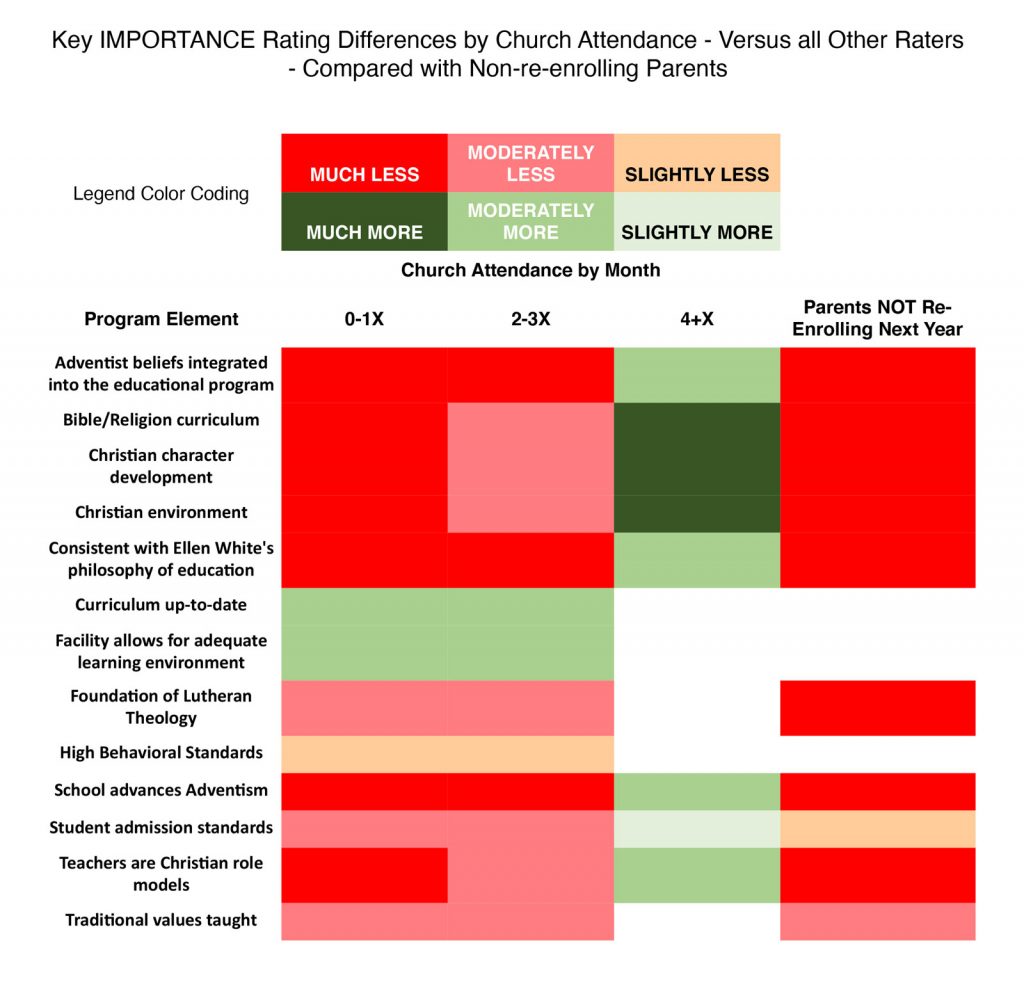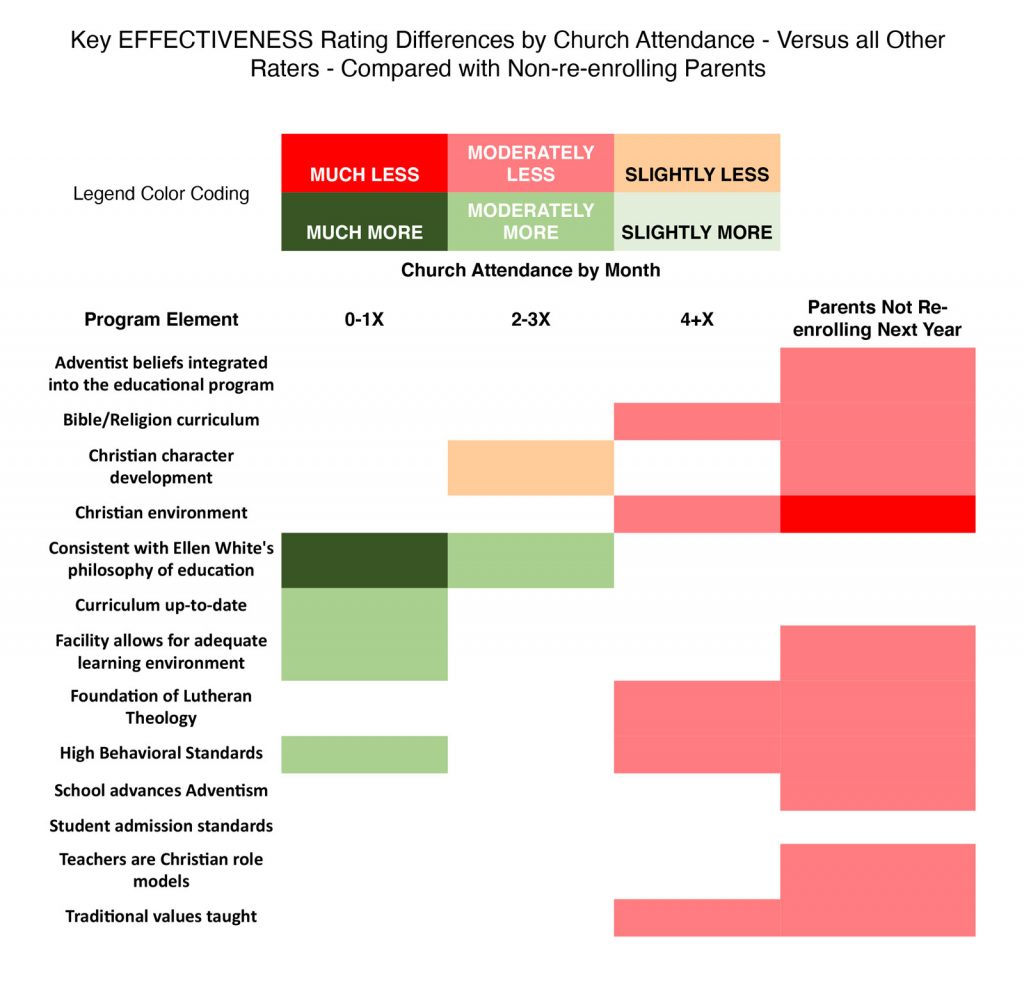Throughout 2021, we have combined our survey data from 821 Christian schools – n>143,000 respondents – and we are analyzing away. This is a very long process, and I probably have spent 3 months on it. In this blog, I want to share some key findings for evangelism schools.
Let’s start with the obvious: When it comes to our students, we are all evangelistic. As is widely reported, most students have decided where they stand on faith issues by age 13. This means high school students who have not decided for the faith are less likely to do so than elementary or middle school students.
The classic distinction between a covenant/discipleship school and an evangelistic school comes down to whether parents are actively involved in a church. In contrast to professing “I believe in God,” a tremendous amount of solid research shows that being actively involved in a church is related to a host of desirable outcomes for parents and students alike (e.g. less likely to get divorced, less likely to use drugs.) Merely assenting to the faith doesn’t predict much at all. Therefore, I am assuming that parents who do not often go to church are our targets for evangelism. Our evangelism goal is to get them to go church regularly.
In our survey data, we asked thousands of parents how many times per month they went to church: 0-1, 2, 3, 4, or 5+. Because they were parents, we asked them to evaluate the program elements of their school the usual way we do it, by asking both “How important is it to you,” and “How well do we do this.” We will do this for 40-60+ program elements, depending on the survey. These are all the usual ones you would expect, including teachers, leadership, curriculum, school environment, discipline, and, of course, faith aspects.
Where adequate data existed, I was curious about real differences between our evangelism project parents and church-going parents. And there were very significant differences.
By the numbers, the values breaks are: (1) Attend church 0-1 times per month, (2) Attend church 2-3 times per month, and (3) Attend church 4 or more times per month. Interesting, in the trends below, 2-3X parents were more like the 0-1X parents, but to a lesser degree.
At a 98% Confidence Interval, here are all the program elements that were significantly different based on church attendance:
Key IMPORTANCE Rating Differences
Note that these are ALL of the clear differences between low or no church-attenders and regular church attenders, evaluating 66 different program elements. They weren’t disagreeing about the value of anything else, particularly. Just the Christian-related items, the program elements that make your school unique.
Note the clear differences on everything Christian for our non-church attenders. It is one thing to tell a Principal it’s fine if my child is taught the Bible, it is another thing for that same parent to think it is important. (Or in the immortal words of a parent I heard about: “They could be worshipping Mickey Mouse, for all I care.”)
Most denominational schools would consider themselves evangelistic and would welcome the non-church attending family in their ranks. However, that same family is not particularly welcoming of the denominational teaching of that school. The effect size differences about denominational issues are not just large, they are HUGE – all negative to our non-church attending parents. In contrast, these same items are frequently much more important to our church-going families.
Note how closely the non-attenders importance differences match the profile of current parents who indicated that they are not returning next year. The key differences between these two groups are actually related to effectiveness scores, where the non-returning are dramatically less satisfied across the board, and overall. Neither group is anchored to your school out of any concern for the Christian elements.
From analyzing the data, it is clear that there is an enculturation process that parents go through to value the Christian elements. For example, all of the Christian elements above are less important to parents with 0 to 2 years of experience with your school. This is never to a large degree, and is typically moderately less important. By year 3, parents see the importance of these items as roughly equal to all remaining raters.
The main concern about evangelism projects is the overall impact on school culture. For example, if a teacher knows that 3 or 4 of her students come from homes that have very little Christian influence, how will she adjust her Bible lesson accordingly? Would that lesson be somewhat more basic? Perhaps she would feel the need to teach basic Christian truths, truths that the rest of the class already knows?
Are there response biases based on church attendance and effectiveness? Here’s the same program elements, with effectiveness rating biases against all other raters:
Key EFFECTIVENESS Rating Differences
Note the items that are rated less effective by both our regular church attenders and parents who are not coming back next year:
- Bible/Religion curriculum
- Christian environment
- Foundation of Lutheran theology
- High behavioral standards
- Traditional values taught
It is not much of a stretch to see that each one of these program elements would certainly be impacted by students and families with very little Christian background or influence. Most troubling would be the large negative score on Christian environment by non-returning parents.
Three Big Ideas
It seems to me there are three big ideas here.
(1) In presenting the results of the PSRS, frequently staff and board leaders are surprised at the high number of parents who are, in fact, going to church. This is particularly true in many Lutheran school situations I have encountered. What if, in fact, at your school, 80% of the parents identify themselves as attending church 4+ times per month? If we bet on it, I would win that bet four times out of five.
(2) So if that is true for you – and you can find out for as little as $995 – do you want to risk the ire of this 80%+ group by “dumbing down” your Bible instruction, or tolerating more misbehavior?
Particularly when you know the 80%+ care MUCH more about all the Christian aspects, much more about high behavioral standards, and much more about traditional values? Particularly when you know these 80%+ are also more critical in their evaluation of how effectively you do the Christian elements and high behavior standards? Particularly when you know that your church-going families are more likely to stay? Particularly when you know the Christian core of your program is how you most effectively differentiate from your public and charter schools, all of which are FREE?
(3) You tell me that you are only getting unchurched families as prospects … and I will tell you to request a website audit. If you know the far majority of your parents care MUCH MORE about the Christian aspects of your program, where exactly is that on your current website?
At a minimum, you need a tab for everything Christian, so it is blatantly obvious that you are in fact thoroughly Christian. With charity and compassion, let me simply say that you attract the kind of people that are motivated to act from your website copy. Your website is a great screener-outer of prospective parents. What if serious, church-going families are taking a pass on you because your school doesn’t seem particularly serious about faith issues?
This is particularly important for you IF: You are part of the conservative Lutheran denominations (LCMS, WELS), given some of the issues with the more liberal ELCA, or if you are Seventh Day Adventist, where many Christians are not exactly sure that SDA is, in fact, a Christian denomination. In both cases, they have to know you are serious about JESUS.
I have a mission’s degree from one of the finest evangelical seminaries in the world. I learned from some of the very best of their time. They were well aware of Christian schools both in the United States and abroad. However, what they drilled into our heads was this: “The greatest evangelistic strategy under heaven is to plant new churches.” Not planting new schools. Schools are a tremendous discipleship strategy for students. Cardus has repeatedly found that students from Christian schools are much more likely to stay in the faith in their 20s.
In light of these sobering results, it is my firm conviction we should focus on our core strength – discipleship.
Next Steps
- Find out how satisfied your parents are with your program elements. Learn more and request a Parent Satisfaction & Referral Survey.
- Request a FREE Christian School Website Audit to discover ways to improve your school’s website and attract more right-fit families.



